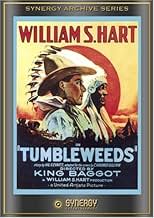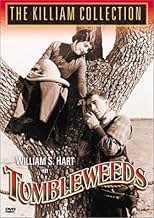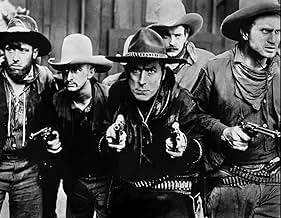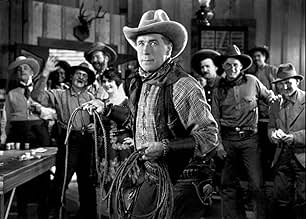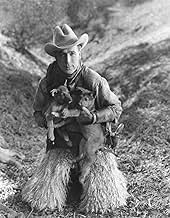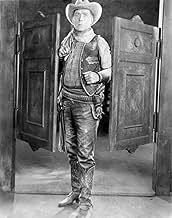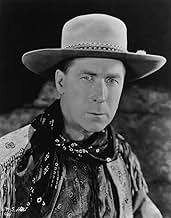CALIFICACIÓN DE IMDb
6.6/10
737
TU CALIFICACIÓN
El gobierno concederá una franja de terreno a los colonos que quieran vivir y trabajar allí. La señal de partida será un disparo que iniciará la carrera hacia los mejores campos y concesione... Leer todoEl gobierno concederá una franja de terreno a los colonos que quieran vivir y trabajar allí. La señal de partida será un disparo que iniciará la carrera hacia los mejores campos y concesiones.El gobierno concederá una franja de terreno a los colonos que quieran vivir y trabajar allí. La señal de partida será un disparo que iniciará la carrera hacia los mejores campos y concesiones.
- Dirección
- Guionistas
- Elenco
William S. Hart
- Don Carver
- (as Wm. S. Hart)
- …
Richard Neill
- Bill Freel
- (as Richard R. Niell)
George F. Marion
- Old Man
- (as George Marion)
Taylor N. Duncan
- Cavalry Major
- (as Ted Duncan)
Nora Cecil
- Pioneer Mother
- (sin créditos)
Nino Cochise
- Indian
- (sin créditos)
Monte Collins
- Hicks
- (sin créditos)
Fred Gamble
- Hotel Proprietor
- (sin créditos)
George Marion
- Homesteader
- (sin créditos)
Apache Bill Russell
- Indian
- (sin créditos)
- Dirección
- Guionistas
- Todo el elenco y el equipo
- Producción, taquilla y más en IMDbPro
Opiniones destacadas
Veteran Western film actor William S. Hart was looking for just one more chance to be in a movie. A couple (1915-1916) of the 11 years he appeared in front of the camera, theater owners voted him their biggest money-making star. His schtick was playing the prototype quiet Westerner who dressed plainly. In all of his films his characters went from mostly a bad-behaving gunslinger or ruffian to become the ultimate moralistic hero. But the public wanted flashier cowboys, such as popular Tom Mix, and more action sequences than contained in a typical character-driven Hart film.
His employer, Paramount Pictures, in 1924 elected not to renew his contract, leaving Hart unemployed at age 60. The actor wanted to ride off into the sunset for one last movie. He dug deep into his wallet and produced his final film, one that critics agree was his best one in a relatively long career, December 1925's "Tumbleweeds." Hart hired scriptwriter Hal Evarts to wrap his story around the 1893 Oklahoma land rush and King Baggot to direct.
Hart intended "Tumbleweeds" as his last hurrah with several references within the script that the Old West is gone since the Oklahoma homesteaders were replacing the cowboys he had been portraying on screen. Hart plays the foreman of a big cattle ranch. The United States government during the early 1890s had ordered all large cattle herds to leave the prairie to be replaced by the new settlers who primarily farmed. Likening himself to a tumbleweed, a plant with no roots, he witnesses other herds leaving and says, "Boys, it's the end of the West." Even women can't cox him into settling down as Hart makes the remarkable statement towards the movie's conclusion that "Women ain't reliable-cows are." Carver (Hart) says he's "headed for South America where there's millions of 'em."
Embedded within the high-budgeted $312,000 film, an immense expense in those days for one person to finance, is a specular land rush scene involving almost 1,000 extras, 300 wagons and a number of horses hired to replicate the scene. The 1931 epic "Cimarron," the Academy Awards Best Picture winner that year, copied Hart's chaotic stampede of homesteaders racing to secure the best land they could stake their claim on.
Hart was able to contract United Artists to distribute "Tumbleweeds." But the actor was disappointed, despite the rave reviews the movie was receiving, because the studio didn't place the film into the larger city venues. He sued UA for such a lack of distribution, but settled out of court in 1940. A year before that, on the heels of John Ford's 1938 "Stagecoach," which rejuvenated the Western genre, Hart was asked to provide a prologue to the re-issuance of "Tumbleweeds" with a soundtrack. The 75-year-old retired actor, now a ranch owner in Newhall, California, gave an eight-minute introduction, with his last words, "The saddle is empty, the boys up ahead are calling, they're waiting for you and me to help drive this last great round-up into eternity." Hart rode into his final sunset in June 1946 at 81 years of age at his ranch. The silent Western movie star is buried near his birthplace in Brooklyn, N. Y.'s Green-Wood Cemetery.
His employer, Paramount Pictures, in 1924 elected not to renew his contract, leaving Hart unemployed at age 60. The actor wanted to ride off into the sunset for one last movie. He dug deep into his wallet and produced his final film, one that critics agree was his best one in a relatively long career, December 1925's "Tumbleweeds." Hart hired scriptwriter Hal Evarts to wrap his story around the 1893 Oklahoma land rush and King Baggot to direct.
Hart intended "Tumbleweeds" as his last hurrah with several references within the script that the Old West is gone since the Oklahoma homesteaders were replacing the cowboys he had been portraying on screen. Hart plays the foreman of a big cattle ranch. The United States government during the early 1890s had ordered all large cattle herds to leave the prairie to be replaced by the new settlers who primarily farmed. Likening himself to a tumbleweed, a plant with no roots, he witnesses other herds leaving and says, "Boys, it's the end of the West." Even women can't cox him into settling down as Hart makes the remarkable statement towards the movie's conclusion that "Women ain't reliable-cows are." Carver (Hart) says he's "headed for South America where there's millions of 'em."
Embedded within the high-budgeted $312,000 film, an immense expense in those days for one person to finance, is a specular land rush scene involving almost 1,000 extras, 300 wagons and a number of horses hired to replicate the scene. The 1931 epic "Cimarron," the Academy Awards Best Picture winner that year, copied Hart's chaotic stampede of homesteaders racing to secure the best land they could stake their claim on.
Hart was able to contract United Artists to distribute "Tumbleweeds." But the actor was disappointed, despite the rave reviews the movie was receiving, because the studio didn't place the film into the larger city venues. He sued UA for such a lack of distribution, but settled out of court in 1940. A year before that, on the heels of John Ford's 1938 "Stagecoach," which rejuvenated the Western genre, Hart was asked to provide a prologue to the re-issuance of "Tumbleweeds" with a soundtrack. The 75-year-old retired actor, now a ranch owner in Newhall, California, gave an eight-minute introduction, with his last words, "The saddle is empty, the boys up ahead are calling, they're waiting for you and me to help drive this last great round-up into eternity." Hart rode into his final sunset in June 1946 at 81 years of age at his ranch. The silent Western movie star is buried near his birthplace in Brooklyn, N. Y.'s Green-Wood Cemetery.
In 1925 when TUMBLEWEEDS was released, William S. Hart was 60 years old and been had supplanted at the box office by a host of cowboy stars like Tom Mix who were much flashier and far less realistic. Hart wanted to go out on top and that is just what he did. TUMBLEWEEDS is set in 1893 during the opening of the Cherokee Strip and his recreation of the mad scramble for the newly opened up Indian lands is a landmark in cinema history which has been copied many times but without the same sense of immediacy that is depicted here.
All the elements of earlier Hart westerns are here, the shy hero, the woman in distress, the 19th century code of honor (Hart was born in 1865), rugged action sequences involving Hart and above all the rugged natural locations of a now vanished West. The production values are high, the photography splendid, and the supporting cast top notch especially Barbara Bedford as Hart's love interest Molly. Bedford played strong independent women during her brief career most notably in the 1920 LAST OF THE MOHICANS.
This new DVD release is an enhanced copy of the old Killiam Collection VHS version that has been around for a while but it has never looked this good. Also included is the 1939 eight minute prologue that Hart did for the film's reissue. Hart was 74 by this time and his recounting of the making of his films and the Old West that he knew is not only informative but also quite poignant. This film is his lasting legacy, a legacy that stretches from Gary Cooper to Clint Eastwood, and it's great to have it on DVD at last...For more reviews visit The Capsule Critic.
All the elements of earlier Hart westerns are here, the shy hero, the woman in distress, the 19th century code of honor (Hart was born in 1865), rugged action sequences involving Hart and above all the rugged natural locations of a now vanished West. The production values are high, the photography splendid, and the supporting cast top notch especially Barbara Bedford as Hart's love interest Molly. Bedford played strong independent women during her brief career most notably in the 1920 LAST OF THE MOHICANS.
This new DVD release is an enhanced copy of the old Killiam Collection VHS version that has been around for a while but it has never looked this good. Also included is the 1939 eight minute prologue that Hart did for the film's reissue. Hart was 74 by this time and his recounting of the making of his films and the Old West that he knew is not only informative but also quite poignant. This film is his lasting legacy, a legacy that stretches from Gary Cooper to Clint Eastwood, and it's great to have it on DVD at last...For more reviews visit The Capsule Critic.
After a while, watching "Tumbleweeds" starts to feel like homework. The movie wore me down after a while. I've seen a lot of silent movie comedies. Many of them aged quite well. As for as dramas go, I haven't seen nearly as many. For me they haven't aged as well. They are a lot harder to watch than the comedies. Add into the mix a very stiff (and seemingly self-serious) William S. Hart and "Tumbleweeds" doesn't stand a chance. There are a few laughs and some exciting action but they are too few and far between. "Tumbleweeds" is okay but it feels a lot longer than its actual running time.
In the 1939 re-release's introduction, William S. Hart explains, "The story of 'Tumbleweeds' marks one of the greatest epochs of our American history. It tells of the opening of the Cherokee Strip in the year 1889. Twelve hundred square miles of Cherokee Indian lands, on one front, over two hundred miles long, were thrown open by our government to those seeking good earth upon which they might make their homes."
Mr. Hart (as Don Carver) and comic sidekick Lucien Littlefield (as Kentucky Rose) are two of the cattle ranchers who are put out when as the Oklahoman Cherokee Strip is "thrown open" by the government. For Hart, the silver lining comes in the form of a several decades younger sweetheart, homesteader Barbara Bedford (as Molly Lassiter); however, her nasty half-brother J. Gordon Russell (as Noll Lassiter) threatens to spoil the fun. Little brother Jack Murphy (as Bart Lassiter) and his pup have the highest profile relationship that actually works. Still, the film has Hart, and its exciting "land rush!" sequence.
The re-release (which, apart from Hart's cool Shakespearian appearance, is the inferior version, by the way) features the legendary star's farewell:
"My friends, I loved the art of making motion pictures. It is as the breath of life to me no longer a cloud of dust, but a beautiful golden haze through which appears a long phantom herd of trailing cattle. At their head, a Pinto pony with an empty saddle the boys up ahead are calling -- they're waiting for you and me to help drive this last great round-up into eternity
"Adios, amigos. God bless you all, each and every one."
******* Tumbleweeds (12/20/25) King Baggot ~ William S. Hart, Lucien Littlefield, Barbara Bedford
Mr. Hart (as Don Carver) and comic sidekick Lucien Littlefield (as Kentucky Rose) are two of the cattle ranchers who are put out when as the Oklahoman Cherokee Strip is "thrown open" by the government. For Hart, the silver lining comes in the form of a several decades younger sweetheart, homesteader Barbara Bedford (as Molly Lassiter); however, her nasty half-brother J. Gordon Russell (as Noll Lassiter) threatens to spoil the fun. Little brother Jack Murphy (as Bart Lassiter) and his pup have the highest profile relationship that actually works. Still, the film has Hart, and its exciting "land rush!" sequence.
The re-release (which, apart from Hart's cool Shakespearian appearance, is the inferior version, by the way) features the legendary star's farewell:
"My friends, I loved the art of making motion pictures. It is as the breath of life to me no longer a cloud of dust, but a beautiful golden haze through which appears a long phantom herd of trailing cattle. At their head, a Pinto pony with an empty saddle the boys up ahead are calling -- they're waiting for you and me to help drive this last great round-up into eternity
"Adios, amigos. God bless you all, each and every one."
******* Tumbleweeds (12/20/25) King Baggot ~ William S. Hart, Lucien Littlefield, Barbara Bedford
For many years prior to 1889, the US government leased the lands of the Indian Territory to cattleman for grazing their cattle herds. Ranches were built. Now the ranchers had to leave by April 1889 as 1200 square miles of the Oklahoma territory were being opened to new homesteaders. (There would be other Oklahoma land runs throughout the 1890s.)
Hart's character, Don Carver, is the typical quiet and intense cowboy known as a "tumbleweed," a drifting cowhand. Carver and his comedic sidekick Kentucky Rose (Lucien Littlefield) ride into the town of Caldwell, Kansas, population 200. This is the calm before the storm as homesteaders begin to pour into town for the big land run. Carver, and later Kentucky, decides to register for the rush, to acquire a piece of free land. The US Cavalry, in charge, has posted warnings that those who jump the starting line before the appointed time will be arrested as "sooners" and kept in a pen until after the land rush.
Seedy Bill Freel, a/k/a Burton (Richard Niell), craves Joe Hinman's Box K Ranch on the Strip (abandoned by decree) as it controls the waterways of the area. He has a devious plan to sneak across the starting line before the assigned date and time. His new partner is nefarious Noll Lassiter (J. Gordon Russell), half-brother of Molly Lassiter (Barbara Bedford). Freel has a yearning for Molly, who loathes him. She has instead developed a relationship with Carver, nearly forty years her senior in real life. Like Freel, Carver also has his eyes on the Box K property (where he formerly worked), including the ranch house.
When Don rides back into the Strip to look for and round up some straying cattle, he is arrested by US Cavalry Major White (Taylor Duncan) at the instigation of Freel and Noll Lassiter. These sordid characters have falsely accused him of being a "sooner." Now by law Carver is kept in the bull pen until after the land run. How Carver escapes is quite innovative, and he happens to have the fastest steed nearby. If only he can make up the lost ground and stake the Box K Ranch grounds.
When William S. Hart reissued this 1925 silent film (his last and perhaps greatest) in 1939, he preceded it with his famous eight- minute "Farewell to the Screen" introduction. Knowing the real West, Hart had arrived in Hollywood in 1914 at the mature age of 49 and acted for eleven years. He and Tom Mix were the greatest cowboys of the silent screen. Hart's partner here, Lucien Littlefield, specialized in playing older roles. In "Tumbleweeds" he looks about sixty even though he is only thirty. Although not as good as "The Iron Horse" (1924), the greatest silent western of them all, "Tumbleweeds" is still worth a look, especially because of the rousing land rush scene, an epic shot from the days of silent cinema.
Hart's character, Don Carver, is the typical quiet and intense cowboy known as a "tumbleweed," a drifting cowhand. Carver and his comedic sidekick Kentucky Rose (Lucien Littlefield) ride into the town of Caldwell, Kansas, population 200. This is the calm before the storm as homesteaders begin to pour into town for the big land run. Carver, and later Kentucky, decides to register for the rush, to acquire a piece of free land. The US Cavalry, in charge, has posted warnings that those who jump the starting line before the appointed time will be arrested as "sooners" and kept in a pen until after the land rush.
Seedy Bill Freel, a/k/a Burton (Richard Niell), craves Joe Hinman's Box K Ranch on the Strip (abandoned by decree) as it controls the waterways of the area. He has a devious plan to sneak across the starting line before the assigned date and time. His new partner is nefarious Noll Lassiter (J. Gordon Russell), half-brother of Molly Lassiter (Barbara Bedford). Freel has a yearning for Molly, who loathes him. She has instead developed a relationship with Carver, nearly forty years her senior in real life. Like Freel, Carver also has his eyes on the Box K property (where he formerly worked), including the ranch house.
When Don rides back into the Strip to look for and round up some straying cattle, he is arrested by US Cavalry Major White (Taylor Duncan) at the instigation of Freel and Noll Lassiter. These sordid characters have falsely accused him of being a "sooner." Now by law Carver is kept in the bull pen until after the land run. How Carver escapes is quite innovative, and he happens to have the fastest steed nearby. If only he can make up the lost ground and stake the Box K Ranch grounds.
When William S. Hart reissued this 1925 silent film (his last and perhaps greatest) in 1939, he preceded it with his famous eight- minute "Farewell to the Screen" introduction. Knowing the real West, Hart had arrived in Hollywood in 1914 at the mature age of 49 and acted for eleven years. He and Tom Mix were the greatest cowboys of the silent screen. Hart's partner here, Lucien Littlefield, specialized in playing older roles. In "Tumbleweeds" he looks about sixty even though he is only thirty. Although not as good as "The Iron Horse" (1924), the greatest silent western of them all, "Tumbleweeds" is still worth a look, especially because of the rousing land rush scene, an epic shot from the days of silent cinema.
¿Sabías que…?
- Trivia(at around 1h 7 mins) Just after the locked-up "Sooners" rush Dan Carver, who is cutting through a rail, the scene shifts to a team of horses pulling a wagon. The right "off" wheeler horse can be seen to go lame but continue running with a noticeable limp.
- Citas
Don Carver: Boys - it's the last of the West.
- Versiones alternativasThe 1939-reissued version was preceded by an eight-minute sound prologue with William S. Hart introducing the film.
- ConexionesFeatured in The Great Chase (1962)
Selecciones populares
Inicia sesión para calificar y agrega a la lista de videos para obtener recomendaciones personalizadas
Detalles
Taquilla
- Presupuesto
- USD 312,000 (estimado)
- Tiempo de ejecución
- 1h 18min(78 min)
- Mezcla de sonido
- Relación de aspecto
- 1.33 : 1
Contribuir a esta página
Sugiere una edición o agrega el contenido que falta

